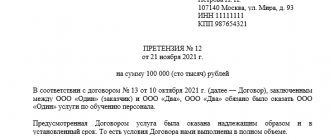When purchasing housing in a house under construction under the DDU, the buyer rightfully expects that the developer will deliver the property on time and the apartment will meet the stated characteristics. Expectations do not always coincide with reality. If the construction company violates contractual obligations, the shareholder has the right to demand compensation for damages or termination of the agreement. This right is given to him by Law 214-FZ “On participation in shared construction”. For each day of delay in case of late delivery of the house, the buyer is entitled to a penalty. If there are deficiencies in the transferred apartments, the builders are obliged to eliminate them before the acceptance certificate is signed. To obtain correction of defects, terminate the contract or receive compensation due, a written claim must be sent to the company.
The procedure for accepting rented housing
In order to correctly write a complaint to the developer, you need to understand how housing is accepted.
Stage No. 1. Obtaining a house commissioning certificate
The construction company has completed construction. Legally, this moment is indicated by the receipt by the developer’s organization of the act of putting the house into operation. The presence of this act can be checked on the website nash.dom.rf, where all developers are required to publish documents about the completed objects.
From this moment, the invitation to shareholders to sign the acceptance certificate begins. In this case, only written notification delivered in person or sent by mail will be considered official notice.
If you are invited to hand over the keys by telephone, this will not be considered an official notification and will not entail legal consequences in case of late acceptance!
The period established by law for acceptance of the apartment by the shareholder is 2 months from the date of his notification (i.e. from the date on which the notification was received).
The share participation agreement may also stipulate other terms of acceptance, but Part 6 of Art. 8 of the Federal Law of December 30, 2004 No. 214-FZ “On participation in shared construction...” gives the construction company the right to sign the act unilaterally only after 2 months from the acceptance date established by the contract.
Stage No. 2. Getting the keys
You came on the day set by the developer to receive the keys.
Important! Do not sign any papers until you have inspected the premises!
Often, construction companies, in order to avoid further possible claims, offer to sign the appropriate papers. This may be an additional agreement to the equity participation agreement, which:
- changes the deadline for handing over the keys if the developer delivered the house late;
- changes the requirements for the premises to the worse;
They may also offer to sign an acceptance certificate in advance, from the moment of signing which the shareholder is deprived of the right to make claims to the quality of the housing, except for guarantees, and assumes the burden of maintaining the property and all associated risks.
Important! Signing the acceptance certificate does not deprive the shareholder of the right to receive a penalty in connection with violation of the deadlines for delivery of the property.
Therefore, you should first inspect the room itself. If you initially have doubts about the integrity and reliability of the construction company, it is better to take an expert with you. The condition of the premises must correspond to:
- terms of the share participation agreement;
- requirements of technical regulations, design documentation and urban planning regulations, as well as other mandatory requirements.
If everything is fine with the premises, you can sign the acceptance certificate. If there are claims against the builders regarding quality, a defect report is signed, which indicates all the identified deficiencies.
Stage No. 3. Elimination of identified deficiencies
The deadline for eliminating deficiencies in accordance with the Consumer Protection Law is 45 days. If the shortcomings are not corrected during this time, you can begin a claim procedure with the construction company.
An unscrupulous developer may act as follows:
- sign a defect report, but do not carry out work to eliminate the defects;
- not to sign a defective act, citing the groundlessness or insignificance of the shortcomings indicated in it.
In both cases, you should order an expert report on the technical condition of the premises and file a formal claim with the developer for defects in the apartment. It is important to do this before the construction company signs the acceptance certificate unilaterally, in order to have proof that you did not shy away from accepting the apartment.
Stage No. 4. Going to court
If the developer does not comply with the requirements specified in the claim, the only option left is to file a claim in court.
The realities are such that it is unlikely to be possible without a trial: the construction company will most likely challenge the claims made against it. Therefore, the main function of the claim is to show the court that on your part all obligations under the contract were properly fulfilled, but the developer does not fulfill his obligations.
In addition, you should not waste time complaining about the construction company to government authorities: this measure is completely ineffective in the case of shared construction.
Claim for windows to the developer: sample
A complaint regarding windows, if the quality does not suit you, is written in the same way as any other complaint to the developer. He is obliged to eliminate the defect if this occurred due to poor quality materials or incorrect work. If the developer sends you a complaint to the company that installed the windows, know that this is not correct, the developer bears all responsibility.
The defect in the apartment should be eliminated in a short time if you contact the developer by writing a complaint. In addition, you can demand payment of compensation for the fact that the delivered object does not comply with the terms of the contract and legal norms.
You can download a claim against the developer regarding windows. This sample is just an example. To describe your situation as accurately as possible, we suggest you contact the site’s lawyers. They will help you draw up a claim based on your requirements.
Grounds for filing a claim
A claim is sent to the developer if he has violated the law or the terms of the contract. Most often, complaints are written to the developer for the following reasons:
- presence of “defects”: walls are not leveled, floor screed is not completed, radiators are not installed, etc.;
- poor quality of work: the apartment freezes, defective or broken windows, leaking pipes, etc.;
- significant differences in room area;
- violation of deadlines for putting the house into operation;
- the house was delivered with an unfinished local area or with extensions that were not included in the construction plan;
- failure of the construction company to carry out warranty repairs.
Claim to an insurance company under compulsory motor liability insurance
Claim for return of a phone of inadequate quality
When is a claim filed against the developer?
A claim may be made in the following cases:
- If the deadline for delivery of the object is violated, then you can demand compensation, penalties, penalties and payment of a fine. If the developer values his own reputation, there is a chance that this amount will be paid voluntarily.
- Dissatisfaction with quality, when it is necessary to eliminate shortcomings that arose due to the fault of the company, for example, if low-quality material was used, unprofessional construction was carried out, communications were not brought into the apartment. Such a claim is written in the name of the developer, regardless of who the contractor is - these are their internal nuances that do not concern the shareholder.
What to demand in a claim?
In case of detection of deficiencies in the condition of the living premises, Art. 7 of the Law on participation in shared construction gives the right to demand:
- elimination of deficiencies free of charge within a reasonable time;
- proportionate reduction in the contract price;
- reimbursement of their expenses for eliminating deficiencies;
- if the shortcomings are significant, i.e. interfere with the use of the premises for their intended purpose, you can terminate the contract and return the money.
In addition, the law provides additional guarantees for the shareholder. Let's consider what can be additionally demanded from the developer.
Compensation for losses
Losses are those expenses that the apartment owner incurred in connection with the elimination of deficiencies made by the construction company: replacing low-quality windows and doors, redoing poor wiring and screeds, replacing heating radiators, etc.
In case of late delivery of the property, if you rented housing, you can try to collect rent for the period of delay. But in court this requirement is rarely satisfied, so you shouldn’t count on it too much.
Penalty for late delivery of a house
Clause 2 Art. 6 of the Law on Participation in Shared Construction gives the shareholder the right, in case of failure to comply with the deadline for the transfer of the premises, to demand payment of a penalty.
The penalty is calculated using the formula: N = C * C / 150 * D.
C – the price of the apartment under the share participation agreement;
C – refinancing rate set by the Central Bank;
D – number of days of delay. The delay begins from the day when the object should have been transferred under the contract and ends with the date of signing the acceptance certificate.
Example. According to the share participation agreement, the cost of the object was 5,000,000 rubles. The developer undertook to transfer the apartment no later than the 3rd quarter of 2021, but actually transferred it on December 10, 2021. The delay was 70 days. The current refinancing rate is 4.25%. Thus, the amount of the penalty is:
5,000,000 * 0.0425 / 150 * 70 = 9,917 rubles.
Penalty for late requirements to eliminate deficiencies
If, during an inspection of the apartment, significant defects were discovered, due to which the use of the premises becomes impossible, and the developer did not eliminate them within 45 days from the date of drawing up the defective act, you can demand payment of a penalty under the Law on the Protection of Consumer Rights.
In accordance with Art. 23 of the Law on the Protection of Consumer Rights, for violation of the deadline for eliminating defects, the developer pays a penalty in the amount of 1% of the price of the product for each day of delay.
Example. When inspecting a rented apartment worth 5,000,000 rubles, it was discovered that its corner was freezing, about which a defect report was drawn up on 02/01/2020. By March 17, 2020, this significant deficiency had not been eliminated. After 20 days, the shareholder filed a lawsuit. Calculation of penalties:
5,000,000 * 0.01 * 20 = 1,000,000 rubles.
Penalty for failure to timely fulfill consumer requirements
This payment can only be recovered in court, so the requirement to pay a fine should be included not in the claim, but in the lawsuit. But in a claim to the developer to eliminate deficiencies, you can be threatened with a lawsuit, where additional demands will be made, including a fine.
According to paragraph 6 of Art. 13 of the Law on the Protection of Consumer Rights, the court awards in favor of the consumer a fine in the amount of 50% of the amount awarded to him by the court.
Therefore, the penalty is calculated as half of all claims awarded, including damages and penalties.
Compensation for moral damage
Like a fine, it is collected only in court. The amount of compensation for moral damage is determined solely by the court based on its own convictions. However, a large amount in such cases is rarely awarded: the average amount of compensation in the country is 10 - 30 thousand rubles.
Sample claim for penalty
Sample claim
Customer Reviews
Gratitude from gr. Moskovchuk V.G. I express my deep gratitude to lawyer Denis Yuryevich for the consultation and bringing the case to its logical conclusion. Legal documents were drawn up very competently and sent to court. The case is won. Hooray!!! Thank you very much!
Plaintiff: Moskovchuk V. G.
Gratitude from D.V. Ezhov, General Director of the SKA-Strelna hockey school The management of the SP-Strelna hockey school thanks the team of the Legal Agency of St. Petersburg for many years of fruitful cooperation and support of Russian children's hockey, dedication and professional approach.
We sincerely wish the employees of the Legal Agency of St. Petersburg great victories, professional success and inexhaustible vital energy!
Gratitude to Konstantin Vasilievich Solovyov I am very glad that I was accepted for a consultation with Konstantin Vasilievich Solovyov. An excellent, very competent lawyer. Please accept my gratitude for your excellent service. Thank you!
Valadze G.G. 08/17/2018
Gratitude from V.N. Skorokhodova Dear Alexander Viktorovich! Let me express my sincere gratitude to you for your understanding, sensitive approach to the situation, openness, emotions and professionalism. I wish you good luck, success in your work and prosperity.
Sincerely, Skorokhodova V.N.
Gratitude from P.V. Greshina I would like to express my deep gratitude to the employees of your company - Sergei Vyacheslavovich Mavrichev and Konstantin Vasilyevich Solovyov for their enormous support, for their competent explanation and good attitude towards people. I wish you success and prosperity.
Greshina P.V. 03/23/2018
Thanks to Stepanov D.Yu. I express my deep gratitude to lawyer Denis Yuryevich Stepanov for his high professionalism and attentiveness to his case when considering the issue in word with a contractor who improperly completed the work of erecting a screw foundation. The cost of the work amounted to 178,300 rubles. And the court of the Vyborg district (Case No. 2-1432/2018) dated March 12, 2018) to collect, taking into account all fines, 504,800 rubles. Once again, I thank you and wish you success in your future work and only successful business conduct.
Grateful to you, your client. 05/18/18
Review by Minina M.V. I would like to express my deep gratitude to Yuri Vladimirovich Sukhovarov for his competent advice and qualified assistance on my issue.
With gratitude, Minina Margarita Vladimirovna.
Gratitude from Ivanov I express my gratitude to Vasily Anatolyevich for the correct and competent legal assistance in solving my case. I wish you and your entire company prosperity and success.
With all my heart, V.V. Ivanov. 05/10/2018
Gratitude from Remedova A.G. I express my gratitude to the Legal Agency of St. Petersburg, namely Denis Yuryevich Stepanov, for the assistance provided in resolving my issue, and I also express my gratitude to the entire team of the consumer rights protection society for their responsiveness and pleasant communication.
Remedova A.G. 08/17/2018
Thanks to Kavaliauskas V.A. I would like to express my deep gratitude to Vasily Anatolyevich, an employee of your company, for his enormous support and competent defense of my case. And also for having a good attitude towards people. I will recommend your organization to all my friends and family.
I wish you success and prosperity,
05/14/2018
How to write a claim?
The basic rule for drawing up a claim is the validity of the requirements. It is necessary to provide each requirement with documentary evidence and support it with the relevant provisions of the law.
List of documents
Thus, a copy of the share participation agreement must be attached to the claim, since the developer is violating the obligations arising from this agreement. Depending on the specific situation, other documents are also attached:
- acceptance certificate;
- defective act;
- construction and technical expertise;
- documents confirming expenses incurred, etc.
Contents and sample of the claim
The content of the claim against the developer largely depends on the specific situation, but there are general rules arising from the law and legal practice that must be observed when drawing up the document. Thus, the rules of business writing must be followed; the text must be written succinctly and concisely, without emotions and, especially, without curses and insults. All described circumstances and events must be dated. Documents are mentioned with details. It is important to provide your valid information (full name, address and telephone number), otherwise the developer will not consider the claim. How to file a claim against the developer in order:
- Document header. It indicates the recipient (full name of the manager, name of the developer, legal address) and personal information of the sender. Information about the developer can be taken from the contract.
- Descriptive part. The events that occurred are described in chronological order, starting with the conclusion of the equity participation agreement and ending with the present moment. At the same time, details of documents or other evidence of what happened are provided.
- Motivational part. In it, the author expresses his thoughts about violations by the developer, cites violated laws and clauses of the contract.
- Final part. It sets out the requirements for the developer. The same part indicates the intention to sue in case of failure to comply with the requirements, as well as the possibility of collecting a fine and compensation for moral damage in court.
- At the end of the document, a date and signature are placed, and the attached documents are listed.
Important! Only copies of documents should be attached to the claim; the originals should be kept by you.
Sample claim
Professional legal assistance is the key to success
An incorrectly drafted claim will not only not have the desired effect on the developer - it can greatly harm the author. Errors in calculating the amount of the penalty, or insufficiently thought-out arguments will reduce the chances of the expected result to zero. Entrust the development of your claim to specialists who have prepared thousands of official papers and won hundreds of legal disputes with developers. Our lawyers know the cost of the consequences of incorrectly drawn up documents. They accurately calculate the amount of compensation, competently substantiate each accusation and claim, and provide links to laws and judicial practice. Leave the solution to your problems to those who are guaranteed to cope with them.
How to properly file a claim?
There are only 2 ways to formally file a claim: in person or by mail. It will be faster to take the claim to the developer’s office in person, but if you are far away or the developer does not accept documents, the only option is to send it by mail.
Personal submission
To submit a claim in person, you need to come to the developer’s office with two copies of the claim. On one copy, the employee will mark acceptance, put the current date and return the document. The second copy will remain with the applicant.
Sending by mail
By mail, the claim must be sent by registered mail with return receipt requested. Next, you should wait for the return receipt, which will indicate the date of receipt of the claim. It is from this date that the deadline for fulfilling the requirements specified in the claim is considered. Sometimes it happens that a company deliberately does not receive letters so as not to respond to them. In this case, after a month, the envelope with the letter will be returned to the sender, which will be considered ignoring the consumer’s requirements.
Complaint against the apartment developer
When a purchased apartment has shortcomings, the developer is obliged to eliminate them. For this to happen, you are required to write a claim listing the problems you encountered. It is important that this claim is registered with the firm as an appeal and that you receive a copy marked as accepted.
What is it for? In case of an unsatisfactory answer, this paper will allow you to better prepare for court hearings, because it forms part of the evidence base.
Time limits for satisfying claims
The deadline for responding to a claim may be established in the contract. The law does not directly establish such a period, so in practice they rely on the rule of custom established by Art. 5 of the Civil Code of the Russian Federation, according to which the developer has 10-14 days to respond. If there is no response within the specified time frame, you can go to court.
As for the deadlines for satisfying individual requirements, it all depends on the requirement itself.
Upon termination of the equity participation agreement, the developer is obliged to return the cost of the apartment and interest for the use of funds within 20 calendar days from the date of receipt of the corresponding request. If the contract is terminated by a court decision, the developer returns the specified funds within 10 working days (Article 9 of the Law on Participation in Shared-Shared Construction).
The period for eliminating defects in an object is no more than 45 days, including during the warranty period. The warranty for the object cannot be less than 5 years, and for the construction and engineering communications of the house - less than 3 years.
Legal basis for claiming a penalty
It is important to understand in what cases a claim is possible; these are legal grounds. Among the main ones is the delay in the completion of the project. It is on this issue that there are most complaints. According to the law, a penalty can also be demanded in the following cases:
- Disadvantages of construction. Among them: cracks, freezing, poor-quality installation of windows, etc. In order for a claim to be made, it is important not to accept an object with defects, especially for obvious defects. If the inspection of the apartment was inattentive and the acceptance certificate was signed, then there is nothing to blame the developer for. As for defects that appear later, such as freezing of walls, then in order to make such a claim, the work must have a guarantee.
- The footage does not correspond to what was stated in the documents - less than what was paid.
- Poor-quality repairs - we proceed in the same way as the first point.
- The presence of additional objects that should not exist according to the plan. These are extensions, basements, etc.
- Violation of technical construction standards.
You should understand in more detail regarding violation of deadlines. The primary contract may be drawn up in such a way that it is difficult to understand when the deadline is. Situations:
- Exact date. If the deadline is specified “no later than October 31, 2017,” then from the next day, November 1, 2017, you can already file a claim for a penalty, since there is already a delay.
- Quarter designation. The agreement will contain the wording “in the 2nd quarter of 2021.” The second quarter lasts from April to June, that is, its last day is June 30. The delay begins on July 1.
- Sometimes the wording is more vague and may depend on the timing of obtaining permits for commissioning. In such cases, the contract specifies “the estimated date is the 4th quarter of 2017.” Data is immediately entered that the transfer of the apartment will occur within 30 days from the date of receipt of the permit. That is, in this case, the deadline for commissioning is December 31, and the period for transferring the apartment to the shareholder is January 30. That is, from the next day you can already consider it overdue.
Important! Developers can resort to tricks and indicate in the contract something like the following wording: “approximate dates...”, “planned...”, “not guaranteed by the developer...”, etc. This does not relieve one from liability for delay, because he must specify a certain date. obliged, from which you can build.
Judicial practice on quality of work
This indicates that contractors are delaying in every possible way the fulfillment of their obligations to correct construction defects. Shareholders are seeking judicial protection, having already included additional demands for penalties and reimbursement of costs for eliminating defects at their own expense.
The courts are usually on the side of home buyers. But you need to fill out documents correctly, save receipts for payment of services and other evidence. Do not fall for the developer’s bait and do not sign documents without consulting a lawyer.
For example, you cannot endorse a transfer and acceptance certificate if deficiencies are discovered. You should not believe the verbal promises (and even written ones; it’s difficult to assess their competence and strength without a lawyer) of the developer’s representatives: “We’ll do everything, you just sign.”
IMPORTANT! It is not recommended to undertake repairs and especially redevelopment in the first year of residence. During this period, deficiencies may appear that are not immediately noticeable, and the contractor usually accuses the owner of carrying out work that caused the deterioration of the home. It becomes more difficult to prove the guilt of the counterparty.
Lawsuit
Federal Law 214 does not provide for a limitation period for disputes with a developer. This issue is regulated on a general basis in accordance with Art. 196 of the Civil Code of the Russian Federation and is equal to three years. The countdown of the specified period begins from the moment when the shareholder learned or could learn about the violation.
In paragraph 32 of the Review of the practice of resolving disputes arising in connection with the participation of citizens in shared construction by courts, it is explained: in cases of discovery of deficiencies, the reduced one-year statute of limitations provided for in Art. 725 of the Civil Code of the Russian Federation, does not apply to buildings and structures.
The purchaser has the right to file a claim during the warranty period, and the limitation period will begin from the moment of filing.
If pre-trial settlement is mandatory under the terms of the contract, the complaint and other evidence of attempts to resolve the dispute with the developer must be preserved and presented in court.
Is it possible to immediately file a claim in court?
Law 214-FZ does not prescribe mandatory claim settlement of disputes. Theoretically, a defrauded shareholder has the right to immediately file a claim in court. But in practice, you need to study the relevant clauses of the contract: in most cases, developers provide for the mandatory pre-trial settlement of disputes for their own safety.
The terms of the agreement usually specify the terms for consideration of the claim, elimination of deficiencies and payment of penalties, which allows the developer to delay the fulfillment of obligations. But it is worth recognizing that pre-trial settlement is also more profitable for the acquirer - there are no court costs, no need to fill out a large number of documents and attend meetings.
If there is no such clause in the contract, you are allowed to immediately sue without notifying the developer.
Dear readers! To solve your problem right now, get a free consultation
— contact the lawyer on duty in the online chat on the right or call: +7 (499) 938 6124 — Moscow and region.
+7 (812) 425 6761 — St. Petersburg and region. 8 (800) 350 8362 - Other regions of the Russian Federation You will not need to waste your time and nerves - an experienced lawyer will solve all your problems! Or describe the situation in the form below:
Document preparation
To achieve the desired result, it is important to correctly formalize the requirements in the claim.
How to write
There are no strict rules for its compilation. Free form is acceptable indicating all significant shortcomings and requirements. It is important to formulate your wishes correctly. Example: uneven walls. You can ask them to equalize or reduce the price of the object. Record your preferred option.
No access to electricity? Indicate the need for uninterrupted connection as soon as possible, demand compensation for damage for days when it was not possible to use the housing for its intended purpose in full (you need to indicate the exact amount and its justification - the inability to work at the computer, cook, etc.). Attach invoices, documents, checks. It is allowed to claim moral damages; its amount does not need to be explained.
If deficiencies are identified, they must be recorded in photos and videos, and this evidence must be attached on a flash card or paper to the text of the complaint. It is important that your expert opinion is drawn up by a professional invited by the equity holder to inspect the property.
The claim is written in the name of the organization - actually the responsible party in the contract. This is not always the company that advertises and talks with the client in the sales office. The responsible legal entity is indicated in the DDU agreement, and its address is also reported there.
Sample claim to the developer for elimination of warranty defects in an apartment or house
Shareholders are allowed to unite and write a collective document if the issue concerns common property. You can apply for protection of rights individually.
Important points:
- The claim should not be written on the developer’s letterhead - in most cases, not all points are taken into account, and during the registration process the shareholder will be confused.
- You can use the services of an independent lawyer (it is also not recommended to resort to the help of specialists from the developer’s legal service).
- The appeal must be written to the address and name of the legal entity that is actually a party to the agreement. It is the name of the organization (it is written in the text of the DDU), and not the full name of its director.
- When specifying two addresses - postal and legal - you can duplicate the request for a quick response. But according to the law, the acquirer’s obligation is to notify the counterparty at the legal address (by checking it with the tax service in the Unified State Register of Legal Entities).
Know! Collectively, shareholders also have the right to complain to the prosecutor's office, the housing inspectorate, and the Ministry of Housing and Communal Services - in particular, regarding delays in putting the structure into operation.
How to give correctly
You can personally hand it over to the developer’s representative in the office or send it by mail with a list of the attachments (listing all attached copies, photographs and documents) and a receipt confirmation.
The complaint must be filled out in 2 copies, the second form with a signature and the company’s seal next to the stated current date must be received and kept.
Legal response period
Is 30 days. It must be indicated in the text of the claim, unless otherwise specified by the terms of the contract. After this period, if there is no response, the shareholder has the right to go to court.
But depending on the specific requirement of the acquirer specified in the complaint, Law No. 214 provides for the developer’s response timeframe:
- In the event of a unilateral refusal by the shareholder to fulfill the DDU on legal grounds, the developer must return the money within 20 days.
- In case of termination of the DDU in court at the request of the shareholder - 10 days.
The terms are contained in Art. 31 ZPPP.
What to do if they refused or did not respond
Failure to respond within the specified period is automatically considered a refusal. In this case, the home buyer has the right to go to court and also appeal the actions of the developer to Rospotrebnadzor.
The statement of claim should include not only compensation for the main obligation, but also add:
- penalty for late execution;
- compensation for material and moral damage;
- expenses for legal procedures and experts attracted at the expense of the consumer.
If a written refusal is received, the reasons must be given. You need to act depending on them. Additional steps may be required: consult with an attorney.
In what cases is a lawsuit filed?
Appeal to the court occurs in the following cases:
- Refusal to pay penalties.
- Failure to respond to the claim within the time period specified in the document.
This suggests that pre-trial settlement, which is mandatory, has not occurred.
In fact, the claim should indicate your requirements, which may be as follows:
- Penalty in the amount...
- Penalty for refusing to voluntarily satisfy a claim.
- Compensation for moral damage in the amount...










